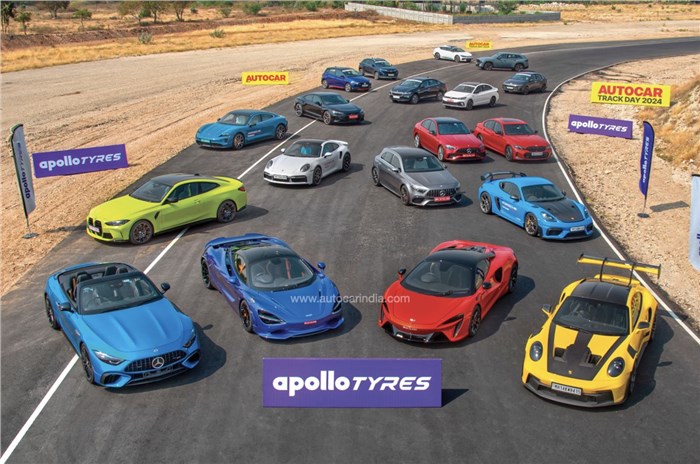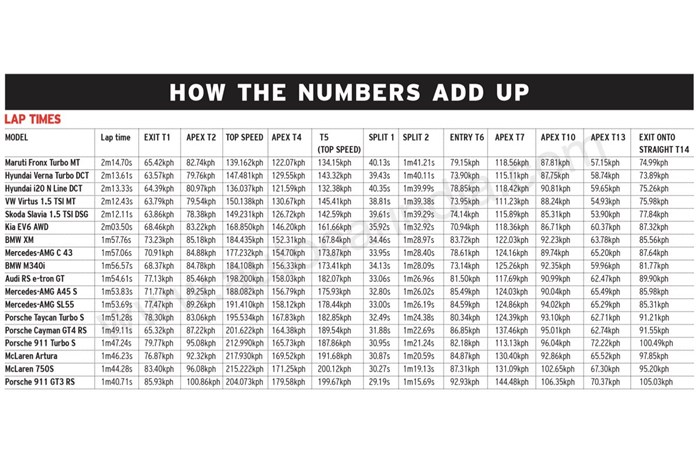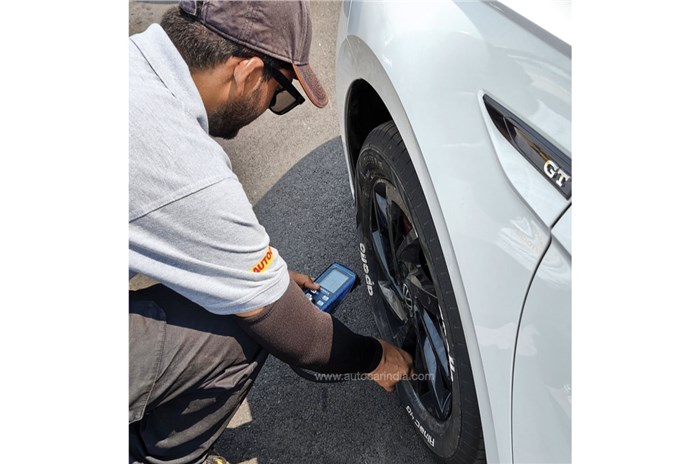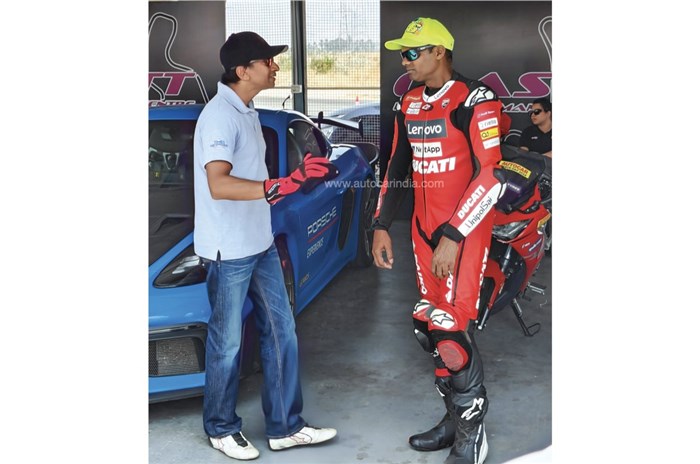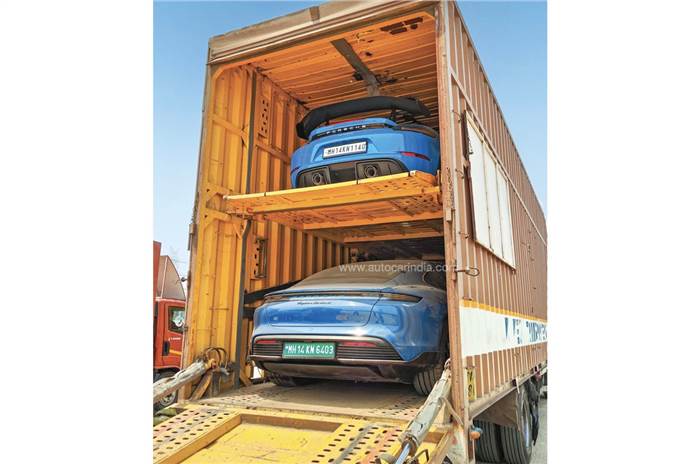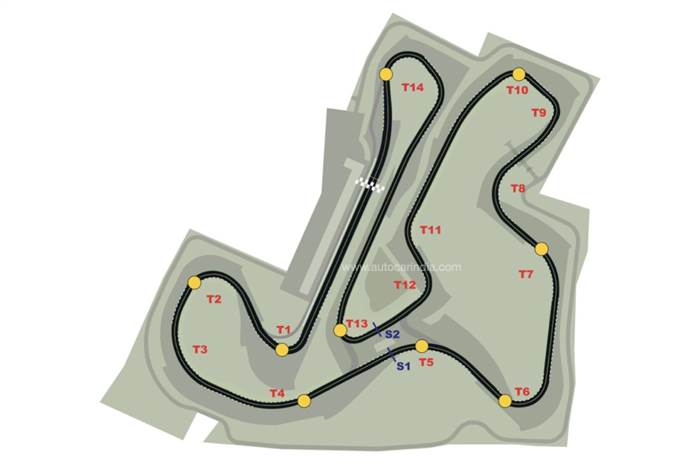The 2024 edition of the Autocar Track Day took place at the even more fun and challenging CoASTT circuit in Coimbatore, with the best line-up we’ve had to date.
Narain Karthikeyan, India’s first and most successful Formula 1 driver, is hopping with excitement. “This is the best line-up we’ve ever had,” he says. Can’t really argue with that; we have practically everything we need for a humdinger of a track day. Up front, two McLarens, four of Porsche’s greatest hits, a couple of character-laden AMGs, Audi’s RS e-tron GT, while the giant BMW XM and Kia’s EV6 come in from left field. This year, we even have a healthy serving of fun mass-market cars. The 150hp Skoda Slavia and Volkswagen Virtus, Hyundai’s Verna with the new 1.5 turbo, and even a pair of fun hatchbacks – the Hyundai i20 N Line and the Maruti Fronx 1.0 turbo. In all, 18 cars, and each one with a unique story to tell.
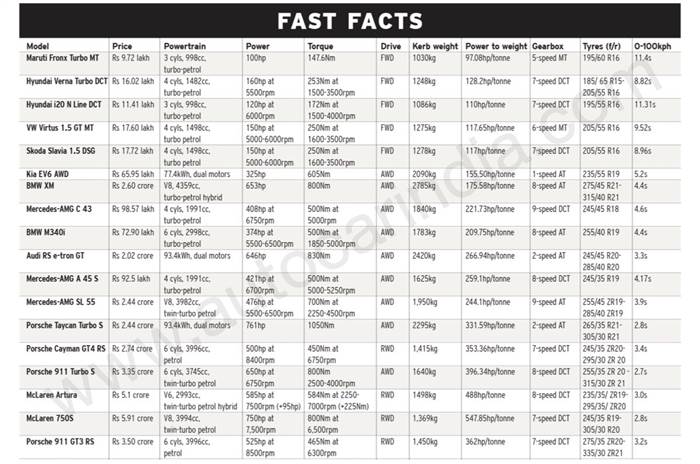
Also fascinating is the CoASTT circuit, a track Narain has been involved with from the outset. Not a track built on a flat piece of land like, say, the MMRT, this one rises and dips, and has a real fast and fun flow to it with very few slow corners. Here, one quick corner, more often than not, leads to another quicker corner, making it technically challenging and dependent on a smooth flow.
What also makes this track unique is that the multiple elevation changes put an emphasis on torque, and the long fast corners mean that if you have a good amount of downforce, you will be even faster. As ever, Narain did one warm-up and familiarisation lap, followed by a timed fast lap. Only unlike earlier, he had no passenger, or 90kg ballast in the passenger seat this time around. I was out on the circuit or waited in the pit. And while the surface was ‘rubbering in’ nicely, the circuit was still devoid of kerbs or proper run offs, meaning Narain couldn’t push quite as hard as he would have liked to. What was disappointing was the fact that we couldn’t run BMW’s M4; the car came for our Track Day with delaminated tyres due to some mix up. So, while you see it in our line-up, you’ll have to wait to read more about it. But enough talk, let’s get cracking.
Maruti Fronx Turbo MT
Time: 2m14.70s
Track rating – 7/10
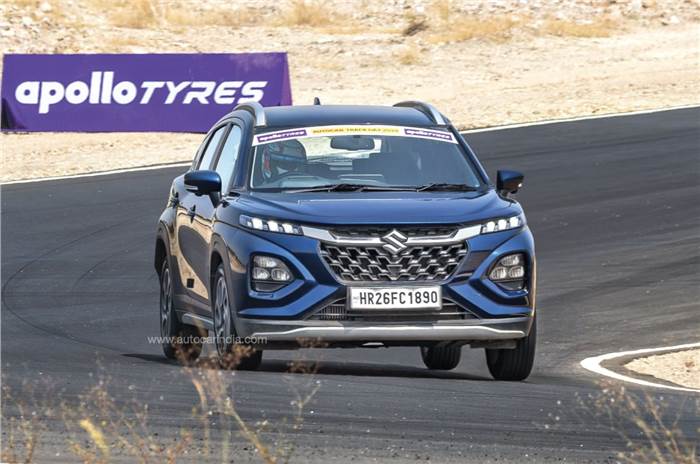
Every once in a while a car flat-out surprises us, and this time it was the Fronx turbo. We didn’t expect much, what with its tall suspension and road-centric setup, but the combination of lightweight, good grip and torquey, responsive turbo engine helped it post a time that really caught everyone’s attention. Narain sang its praises: “It generates a lot of grip from the tyres, and while it rolls, it’s well-contained.” The best part: the turbo engine pulls hard and the manual gearbox is light and quick. “It’s not built for a track, but it did an outstanding job.” The top speed, for example, was higher than the Hyundai N Line and, even more surprisingly, so were some of the corner speeds. It does have a healthy power-to-weight ratio and that sure does help.
Hyundai i20 N Line DCT
Time: 2m13.33s
Track rating – 7/10
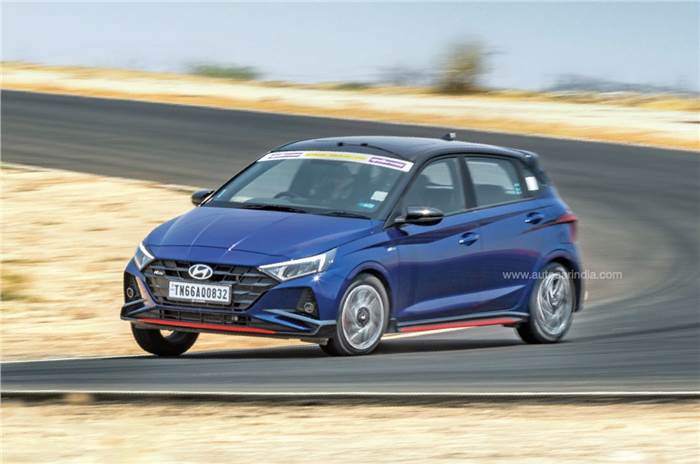
The i20 N Line doesn’t just look sporty but also gets a stiffened suspension and a sportier overall setup. This works well for it on the track, where it doesn’t feel out of its depth. See how much speed it carries out of corners 10, 13 and 14. Narain even liked the manner in which it tackled corners. “The steering weighs up nicely and it feels sporty because body roll is kept in check,” and this allows it to carry speed. The weak point here, however, is the engine. “You make up time in the corners, but as soon as you hit the straight, or especially a bit of a gradient, you start to fall back.” Take a look at the top speeds it hit, and compare and contrast it with Maruti’s Fronx turbo, which, on paper at least, has much less power and torque.
Hyundai Verna Turbo DCT
Time: 2m13.61s
Track rating – 6/10
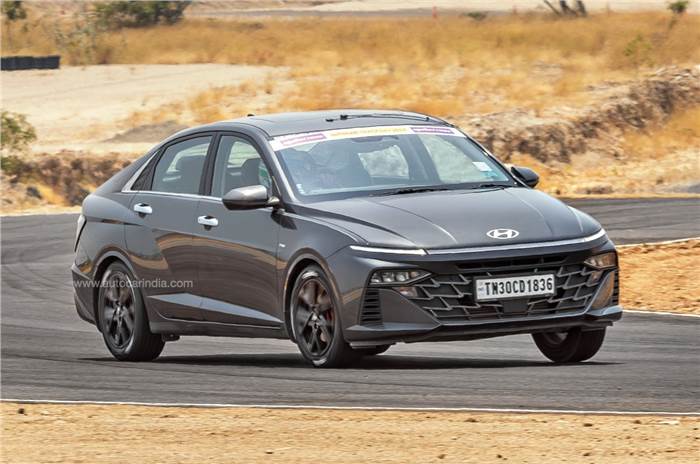
With 160hp and a low-slung profile, the Verna 1.5 turbo seems to be at home on the track and is fast in a straight line. Where it loses out is that its suspension setup is a bit too comfort-oriented and soft for the track. Narain liked the speed down the straight and the fact that “the engine pulled hard, making it feel strong almost everywhere.” The Verna, however, is slower in corners than rivals (see table) and found it difficult to put power down cleanly when exiting corners. “Rotation when you turn in is also slow,” and this makes it even harder to get a good time. “It even overheated and went into ‘protection mode’ towards the end,” explained Narain, slowing it down even further. It was doing much better at the first split.
Volkswagen Virtus 1.5 TSI MT
Time: 2m12.43s
Track rating – 7/10
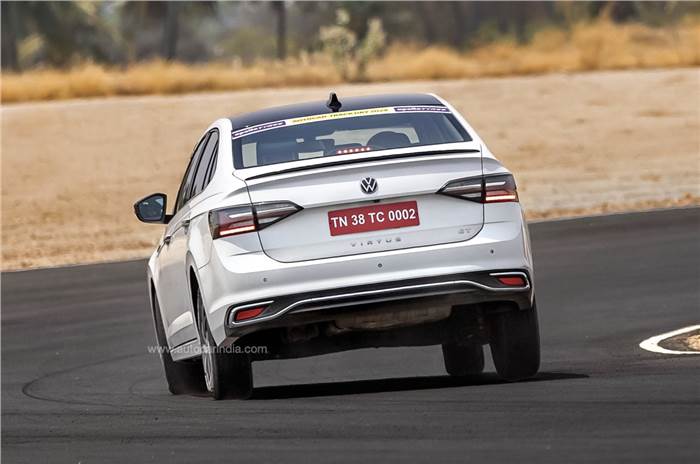
With its powerful 150hp engine and a slick manual transmission, the Virtus GT is a car that gets many fundamentals right. Narain was very happy with the engine. “Power delivery is quite linear, and speed keeps building, so it is fast in a straight line.” It also has loads of torque. This is clearly borne out by its raw speed in T4 and T5, as the engine puts down its 250Nm and powers up the hill, reaching speeds higher than that of the Verna, despite the latter’s power-to-weight advantage. The high ground clearance and the need to give it a comfortable ride, however, mean the Virtus leans a bit more than is ideal, so the grip is not at the same level as the performance. Also, it could have gone faster but the ESP kept cutting in.
Skoda Slavia 1.5 TSI DSG
Time: 2m12.11s
Track rating – 7/10
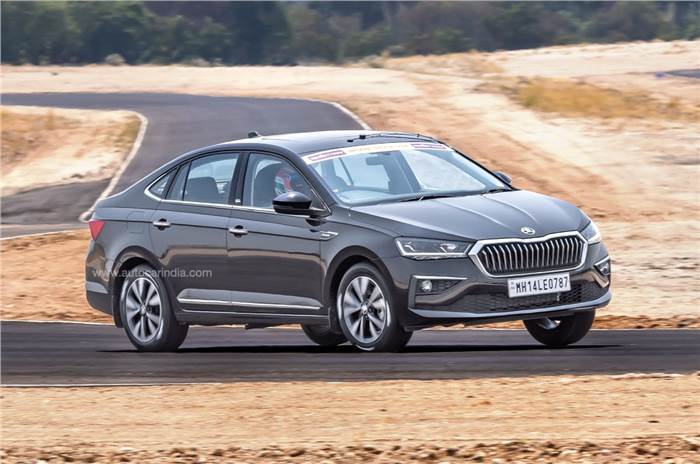
Equipped with the twin-clutch automatic gearbox rather than the manual, the Slavia was a bit quicker than its VW twin. Narain put some of that down to its ability to execute quicker shifts, especially when downshifting into corners and when accelerating out in a straight line. The Virtus still held an advantage running up the hill, where you could hold on to a gear on the manual gearbox for longer, and what’s fascinating is that the Skoda’s top speed is lower. But that apart, it was marginally quicker almost everywhere else. Still, check out the first split, where the Skoda is slower and then slowly claws back time through the lap. Narain also said the feel of the car was different from that of the VW, especially the “state of tune of the steering.”
Kia EV6 AWD
Time: 2m03.50s
Track rating – 7/10
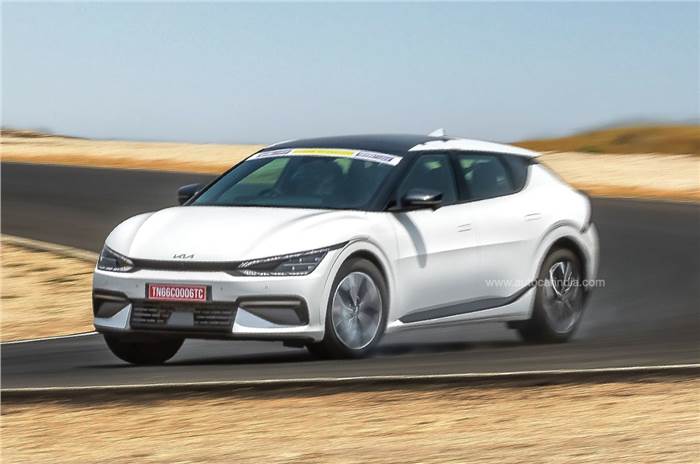
Not what you expect; real pace and did a really quick time.
Electric cars are not as exciting as combustion-engined cars. They can, however, deliver a quick time, like the 325hp, 605Nm Kia did. “A 2:03 is a really quick time on this circuit,” explains Narain. “And it felt mega on the track and loads of fun, as you can even drift the car. You do feel the weight of the car, however, especially when transitioning through corners.” Like the big BMW XM, it struggles through the last few corners of the lap, where weight transfer and poise matter so much. The biggest issue, however, were the brakes that soon faded after Narain’s hot lap. “The brakes are pretty on/off,” and proved to be difficult to modulate consistently.
BMW XM
Time: 1m57.76s
Track rating – 4/10
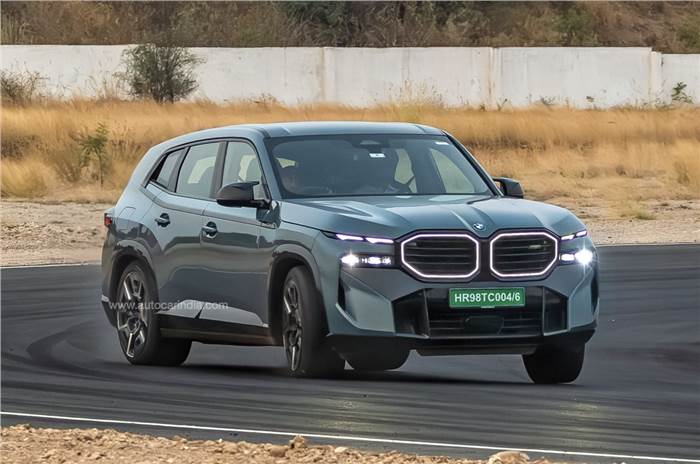
2,785Kg: must be some kind of record for a car driven hard and timed on a track. And yeah, as you may have guessed, you sure can feel the weight. “You feel it under braking,” says Narain, “you feel it when you are cornering the SUV hard, and you especially feel it when transitioning it from one corner to the other.” Then there’s the other factor: the centre of gravity is so high, Narain found it difficult to drive flat-out. The gearbox and power delivery are very M-car-like though, and it is powerful and fast. But it clearly isn’t for the track. That said, Narain liked the looks and thought that it would chew up the miles on the road with its 800Nm of torque.
BMW M340i
Time: 1m56.57s
Track rating – 7/10
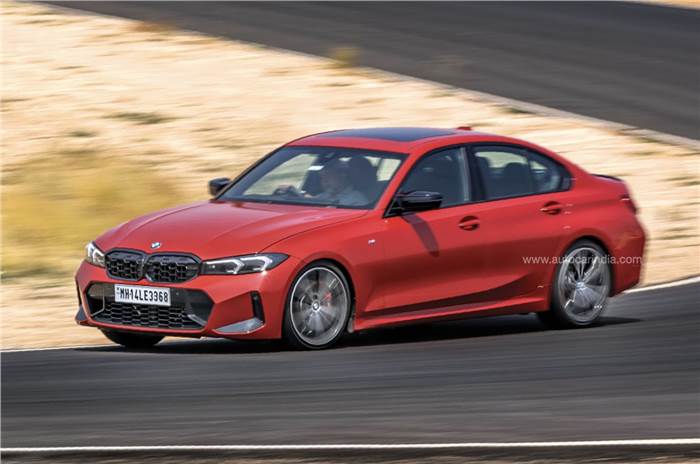
Stonking straight-six engine, but four-wheel-drive system causes understeer.
With the M340i, you get one of the sportiest turbocharged straight-six engines. There’s a lot of punch in the midrange, the engine loves to rev and this makes it very enjoyable on the track; check out its top speed. It even gets a bit of electric boost to help drag it out of low- and mid-speed corners. Narain also liked the steering and how direct it felt. The four-wheel-drive system, however, is set up for safety. “After turn in there is plenty of wheel shudder and understeer when you up the pace, and this eventually leads to snappy oversteer. The rear-wheel-drive 3 Series are so much better suited to the track,” he explained. With track temperatures soaring, the BMW, like the Mercedes, also went into limp home mode towards the end of the lap.
Mercedes-AMG C 43
Time: 1m57.06s
Track rating – 7/10
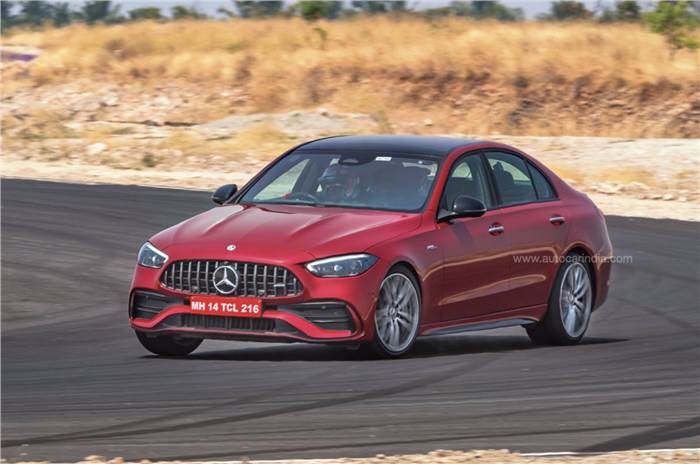
A very driver-focused car and the engine sounds good.
The C 43 has four cylinders and e-boost where most people think it should have six. This impression of it being down on cylinders and so logically (and falsely) down on power is probably its biggest undoing. Thing is, the four cylinder just loves to rev, and the e-boost is so strong, the C 43 accelerates to 100kph almost as quickly as its arch rival, the BMW M340i. Narain even likes how it sounds and thinks the four-wheel-drive system is better set up than the BMW’s, with crucially less understeer built in. He could even carry more speed into some corners, which also came as a surprise (see table). Like the BMW, the junior AMG went into limp mode towards the end of the lap, resulting in a slower lap time.
Audi RS e-tron GT
Time: 1m54.61s
Track rating – 6/10
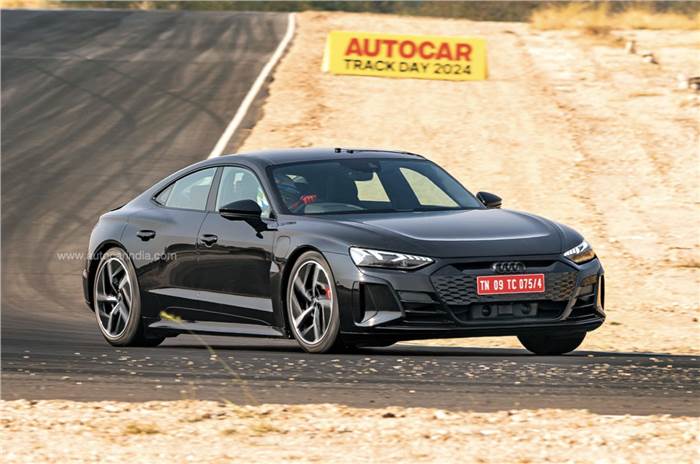
The Audi e-tron GT and the Porsche Taycan share the same platform and a majority of mechanical bits. The two cars are, however, very different when it comes to the setup and how they drive. Of the two, the Audi is the more road- and comfort-centric. “The ride is better and there is more compliance in the suspension,” Narain explains. Straight-line performance, however, is extremely strong; it delivered a top speed of 198.2kph despite being roughly 200hp down on the Porsche. It wasn’t as quick over a lap, however. “There’s a lot more lean in long corners and dynamically it isn’t as sharp as the Porsche.” The Audi was, in fact, 7-8kph slower in certain corners, and that makes a huge difference; it doesn’t attack corners with quite the same resolve.
Mercedes-AMG SL 55
Time: 1m53.69s
Track rating – 7/10
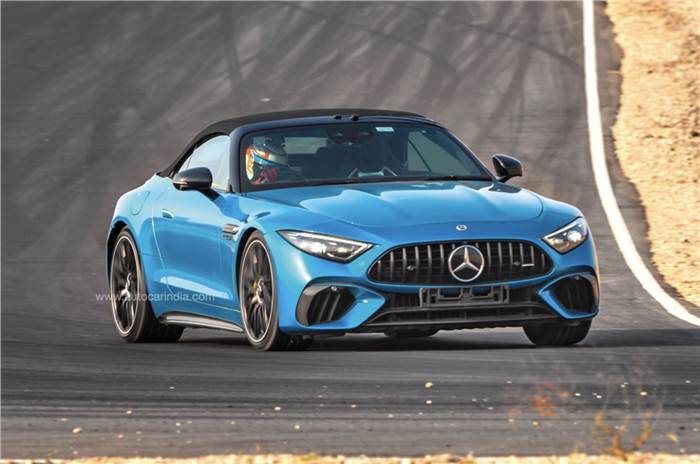
This icon has a strong V8 engine and it’s relatively easy to drive fast.
A Mercedes SL normally doesn’t belong on a track. But this is an AMG, and comes with, as Narain puts it, “a strong V8 that has an awesome soundtrack.” The pace is there for sure and the SL attained a top speed of 191kph. Unfortunately, the car came with different front tyres to the rear, so the lap times were not consistent. “I had a lot of understeer when I turned left,” explained Narain. “It’s a shame we could not get a proper push lap, as this could have been much faster.” Being a convertible, it isn’t quite as sharp as a hardtop car. “You feel a slight amount of flex, but what is important is that this icon is easy to drive fast and you can even get it sideways on rotation, despite the 4-wheel-drive system.”
Mercedes-AMG A 45 S
Time: 1m53.83s
Track rating – 9/10
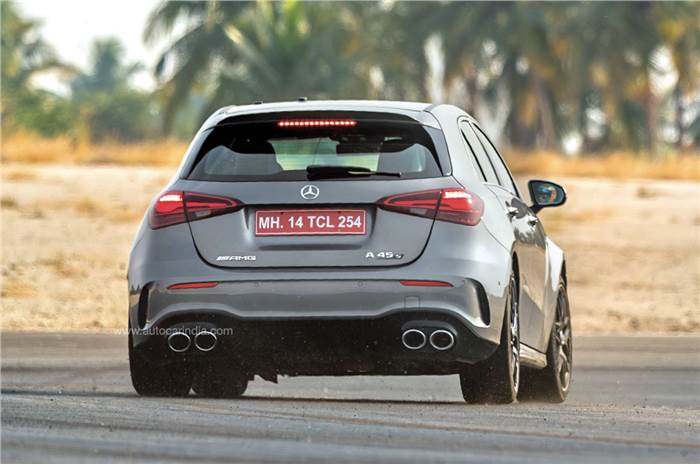
From the manner it takes off like a scalded cat and is quick to shift, the A 45 S gives you a good impression. The engine loves to rev hard and there’s a snarl from under the bonnet as the tachometer whips through the top end. In addition, “the short wheelbase and setup mean it is pointy, and there is a lot of rotation so you can have a lot of fun.” Narain liked the car so much, he called it a pocket rocket and likened it to a small race car. “It doesn’t roll too much and the fun factor is right up there,” he said; high praise indeed. “I could keep the throttle pinned all the way up the hill from Turn 2 to Turn 5, the A 45 doing 185kph on top.”
Porsche Taycan Turbo S
Time: 1m51.28s
Track rating – 8/10
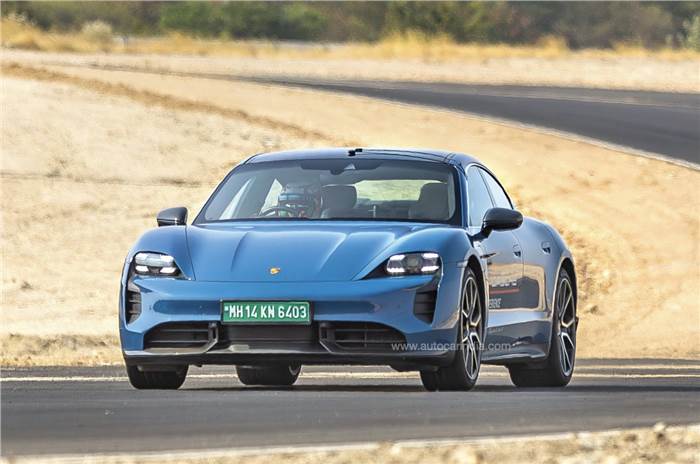
We know electric cars are fast in a straight line. Tesla has made a habit of prodding ICE carmakers with its ludicrous acceleration times. Now Porsche has also proved that the Taycan is a force to be reckoned with at a track. Narain was in raptures: “It feels very planted at speed and what helps is that the dynamics are so well sorted. And it is sort of neutral to drive, with not much scrub or understeer.” It’s amazing that for something that weighs nearly 2.3 tonnes, it produced a time in close proximity to many sportscars. The massive torque also helped it rocket up the hill to T4 quicker than everything above the McLaren Artura, and that’s saying something. And if any car shrinks around you, it’s this one. And all this without any temperature-related limp mode issues.
Porsche 911 Turbo S
Time: 1m47.24s
Track rating – 9/10
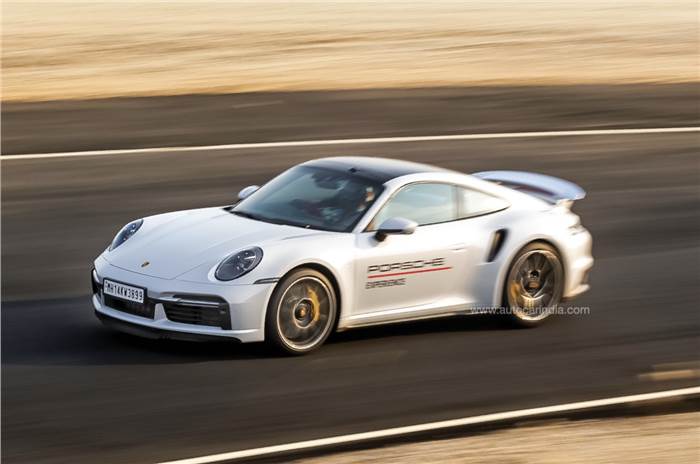
What’s the fastest car we have here – in the traditional sense – from 0-100kph? Yes, you guessed it, it’s this 911 Turbo S that takes just 2.7 seconds! Put your foot down out of a corner and you can feel the raw thrust; and that’s despite not having the apex speed of most other cars at this end of the table. And boy does it put all the torque to good use! Just look at the first split time of 30.95sec after the run up the hill. While the GT3 and GT4 drive home their downforce advantage, the Turbo S does it on raw grunt and that 800Nm of torque. “It feels bigger, but again this incredible car is faster and easier to drive fast than many rivals here.”
Porsche 718 Cayman GT4 RS
Time: 1m49.11s
Track rating – 9/10
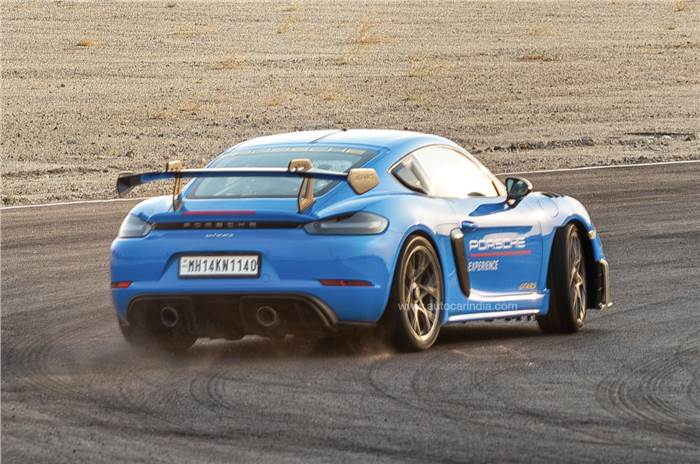
The mid-engined GT4 RS is a car that has everything going for it. A great, naturally aspirated engine placed between the rear wheels that revs to 9,000rpm, a gearbox that is always on the ball, and a nimble demeanour that makes you feel at home due to all the mass of the car being concentrated in the centre. “It may not be as quick as some of the fastest cars here but when it comes to fun factor, it is right up there with the best.” What adds to the drama is that the engine is placed behind your ear and this makes it feel like you are driving a purpose-built track car or a single-seater. The GT4 was also the second-fastest car getting into the tricky T7, carrying a huge 137kph into the corner, and that’s down to the extra downforce.
McLaren Artura
Time: 1m46.23s
Track rating – 9/10
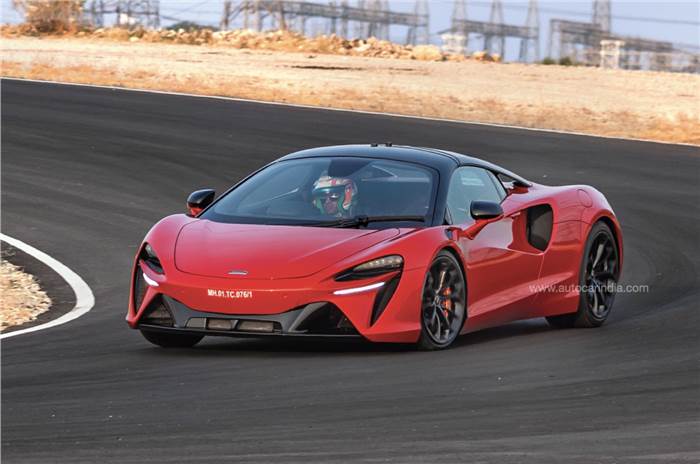
It only has a V6, hybrids are boring, it can’t be fast; these and other myths comprehensively dispelled, right here, right now. Well to kick things off, Formula 1 cars today are hybrids that use a system very similar to the one used on this car. And it was the Artura that recorded the fastest straight line speed of all the cars here; 217.9kph. “The big surprise is that it isn’t very hard-edged, but still manages to deliver a very quick lap time. It isn’t very demanding to drive hard either.” This is a great combination, and unlike the AWD 911 Turbo S, the McLaren gets only rear wheel drive. Of interest is that a relative lack of downforce and only rear wheel drive means it isn’t very quick up the hill compared to the rest.
Porsche 911 GT3 RS
Time: 1m40.71s
Track rating – 10/10
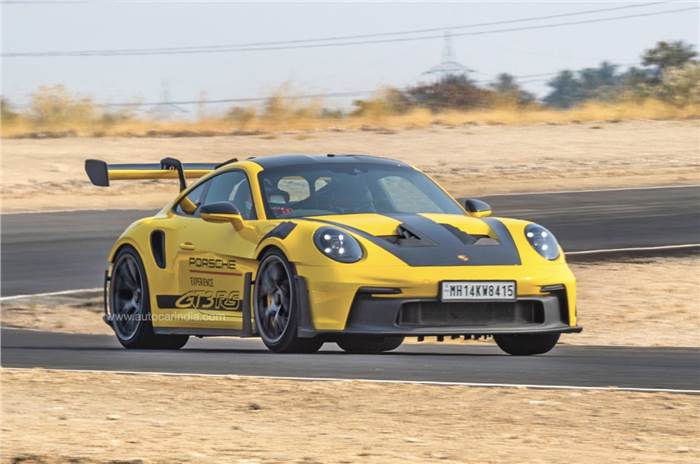
The 911 GT3 RS is at least 10kph slower in a straight line compared to the top four, but it’s still at least three seconds faster over the lap! How? Simple; every single part on this car has been optimised to make it go faster around a track. Suspension, differential, aero, brakes: it even gets DRS. “You can brake deep after the 100-metre board and the massive downforce allows you to stay flat from turn two all the way up the hill.” So it’s as quick at the top of the hill as the McLaren 750S, and that’s despite having way less power and torque. Fresh rubber and a more rubbered in track also allowed it to be around 2.5 seconds quicker than its last lap recorded here. And that Narain has broken multiple lap records at various tracks in this very car must have played a big role too.
McLaren 750S
Time: 1m44.28s
Track rating – 9/10
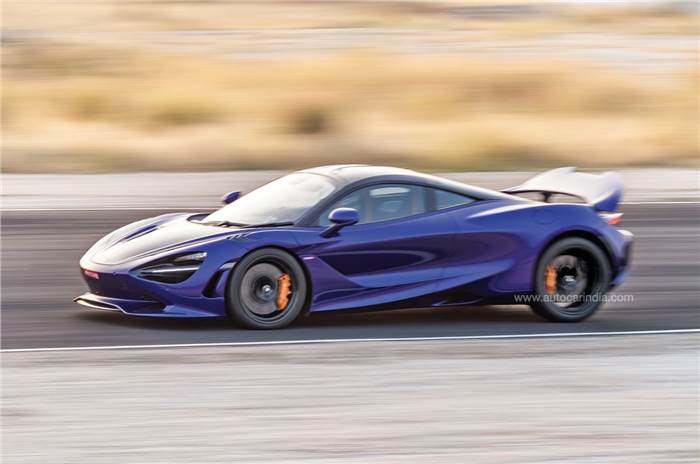
Supercar and track star rolled into one; it could have gone much, much quicker.
There’s huge pace and power from the 750S straight off the bat. And what drama! You could hear Narain modulating the throttle out of corners, the rear wheels struggling to put the power down despite the new Trofeo R tyres. And it just looked mad braking into corners with the big rear ‘tray’ popping up aggressively. “The carbon monocoque means there is just no flex on this car and although you can’t see it, this car has very effective aero that you can feel from behind the wheel,” said Narain. It could have gone quicker still, but Narain only had a couple of laps at the end of the day, and the layout of this track hands the advantage to the aero-focused GT3 RS. But how many other cars have supercar drama and pace, and on track speed in the same package?
CoASTT: One hot lap
Length – 3.80 kilometres; Minimum width – 12 metres
What does one lap around CoASTT look like? Who better than Narain to take us around. The lap starts with a short start-finish straight that gently runs downhill and allows you to pick up speed. “Turn one is wide, so you can take a couple of lines through that first right-hander,” he says, “and then, before you know it, you have to turn left into turn two.” Placing the car correctly here is important for this long uphill run and in a fast car, you can feel the g-forces build on the 650-metre near-flat-out section – Turns 3 and 4. “Braking accurately at Turn 5 on the top is a challenge and the tightening double apex turn 6 is tricky.” Turn 7 is a left and then you run to the bottom and climb up again, going right at Turn 8: an uphill. Use your imagination and this dips and rises like a mini Eau Rouge from Spa Francorchamps, only here you have to brake on the way up the hill for a pair of 90 lefts – 9 and 10 – that follow in quick succession. Further up you need to be neat and tidy into 11, so you can carry good drive into turn 12 (right and left) and then downhill again into Turn 13, a slow corner that leads to another 400m straight. Turn 14 is a mildly banked 180-degree double apex left that leads to the start-finish straight where again it is difficult to pick an ideal line. “There are multiple possible lines and even I haven’t figured out which is the fastest yet,” says Narain.
Also see:
Autocar Track Day: India’s best riding bikes 2024
